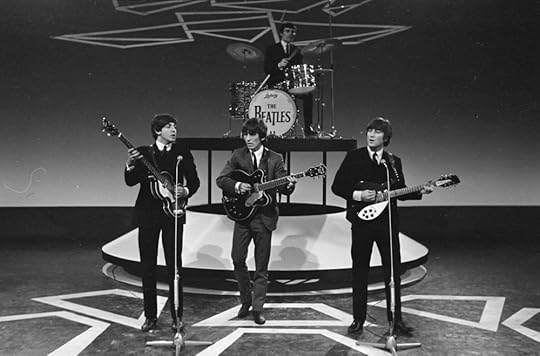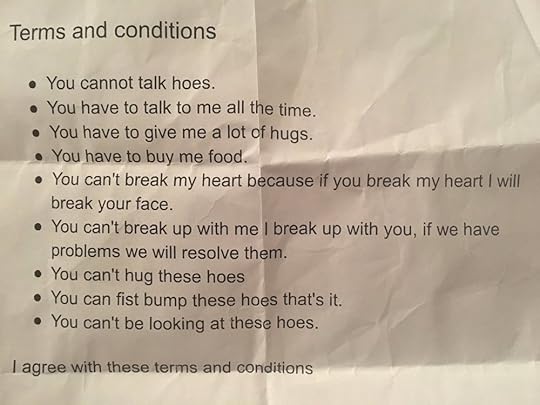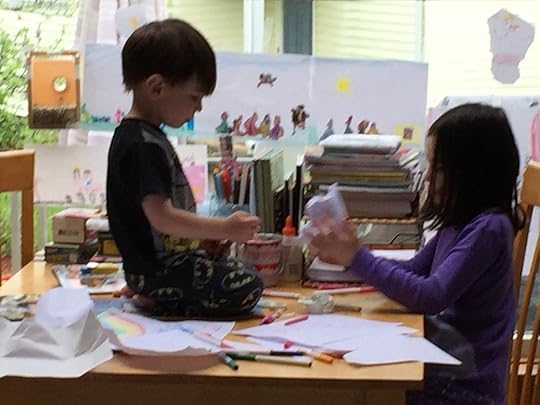Matthew Dicks's Blog, page 308
June 17, 2016
"Third verse same as the first" is stupid and annoying
I'm fond of Lee Ann Womack's "I Hope You Dance."
That is, I'm fond of about two-thirds of the song. Then Womack repeats the first verse as the third verse, and my fondness is gone. This annoys the hell out of me, and though it's not done all that often, it's still done too much.
As a storyteller and writer, I would never think of covering the same ground twice. It's the least interesting way to fill a page or time on the stage. And with music, repetition is already embedded in most songs in the form of a chorus. Adding a second layer of repetition seems crazy to me, and yet musicians - great ones, too - do this for reasons I will never understand.
A few notable examples:
"Eight Days a Week" - The Beatles"Little Lies" - Fleetwood Mac"Never" - Heart"Walk of Life" - Dire Straits"Legs" - ZZ TopA whole bunch of Savage Garden and Christopher Cross songs. "Prove My Love" by The Violent Femmes, who actually acknowledge the ridiculousness of repeating the first verse by singing "Third verse same as the first" in the song.



With the exception of The Violent Femmes, who seem to note the silliness of the repetition and therefore escape my wrath via irony and self awareness, I can't listen to any of these songs (some of which I like a lot) without thinking that they are deeply flawed in some way.
Four lines. That's all that each of them needed. Just two more pairs of rhyming couplets.
Would it have been so hard to produce something original for the last verse?
June 16, 2016
The world's first decent veggie burger. Not really because it's still a veggie burger, but better.
I discovered that my school serves a veggie burger with bacon.

It may sound counterintuitive, but unless you are eating a veggie burger because you are someone who doesn't eat meat for ethical reasons, this makes so much sense.
A healthier burger option, made more palatable by a slice or two of bacon. It still tastes more like a clump of mud and grass than an actual burger, but if you were looking for a healthier version of the bacon cheese burger, why not remove the beef but leave the bacon?
Brilliant. Right?
June 15, 2016
My son has become a non-stop death machine.
Ever since our cat, Owen, died last month, my four year-old son Charlie has been obsessed with death.
Specifically his own death.



This has not been good for me, given that I am obsessed about my own death more than anyone else on the planet. My mortality is something that I consider on a (no exaggeration) hourly basis at least.
You may think I'm crazy, but I've died not once but twice and been brought back by paramedics both times. Had a gun was put to my head and the trigger pulled. I was also diagnosed with the adult-onset muscular dystrophy gene that eventually contributed to the death of at least three of my relatives, including my mother, and will one day effect me, too.
If anyone gets to have an ongoing, ever-present, overwhelming existential crisis, I think it's me.
But now I have this four year-old existential reminder machine running around the house, constantly telling me that he doesn't want to die. Constantly reminding me of the thing I don't need to be reminded about.
Our standard response to Charlie's declaration that he doesn't want to die has been, "You won't have to worry about that for a long, long, long time Charlie. You have a very, very, very long life ahead of you."
There's also talk of a heaven that I wish I believed in but don't and assurances that everything will be okay.
It hasn't exactly eliminated his fear, but it's been enough to move him onto a new topic.
Yesterday morning, as I brought him downstairs, he saw a photograph of Owen. He walked over, touched the photo, and said, "Dad, I don't want to die."
Just what I wanted to hear at 6:30 AM.
I answered as I always do. "Don't worry buddy. That's not going to happen for a long, long, long time."
"But Dad," Charlie said, turning away from Owen's photo to look at me. "A long, long, long time means I am going to die someday."
Damn it. The kid understands. He knows.
Honestly, my thoughts of death are my greatest burden. The thing I carry with me like a loadstone throughout my life. My existential crisis informs so much of what I do. It makes me who I am. It's responsible for much of my success. It's the guiding principle behind everything that I think and believe.
I'd hate to think that Charlie might suffer the same fate.
I'd also hate to think that my son is going to continue to pick at this open wound for the rest of my life. It's hard enough already without this beautiful little boy hitting me over the head with an existential sledgehammer on a daily basis.
I picked him up, hugged him, and did what I always do when my thoughts of death become too great to bear. I opted for distraction.
"Want to go watch the Octonauts?" I asked.
"Sure," he said. And for an hour or so, we sat on the couch together and forgot about our mortality. The reality of our eminent demise. The terror of the void.
At least he did. I hope.
June 14, 2016
Staging your home for sale is stupid and self-destructive. Kind of like lipstick. We must end the insanity.
My friends are selling their home. Moving away. It's miserable.
As a result, they are in the process of showing their home to would-be buyers, and part of that process is staging the home. Flowers on tables. Real and/or plastic fruit in bowls. Flowers on a side table. A second set of towels to replace the used ones in the bathrooms.
And of course counters and desktops are cleared, toys are hidden away, a tablecloth is added to their kitchen table. Flower beds are maniacally weeded. The grass is cut to perfection.
And my friends are only doing the minimum. Many staging guides online suggest hundreds of other tactics, often costing thousands of dollars. There are now companies that will stage your home for you, rearranging your furniture to make the house look bigger and adding furniture, lamps, vases, and other items from vast warehouses of home goods.
All of this in the service of making the home look more attractive to would-be buyers.

Here's the thing:
We all know that these houses are being staged. We know that the lack of clutter and clusters of fruit and flowers are not real. We know that bath towels are never as fresh as they appear in a home for sale. We know that children rarely make their beds. We know that paper-free desktops and dish-free drying racks are only found in the homes of the most compulsive people. We know that flower beds without weeds and refrigerators without magnets are unrealistic.
And yet we allow this farce to continue. Sellers continue to present unrealistic and false projections of their homes, and buyers agree to continue to allow these fabrications to influence their purchasing decisions.
I have an idea:
Let's just all agree to stop spending money on creating these falsehoods and instead agree to look at hones that appear like real homes. Absent of bowls of fruit. Complete with damp bath towels and cluttered countertops. Littered with Legos. Why don't we all agree to look at homes that look like real homes and not catalog-versions of homes that do not exist in real life?
Sellers will save money and perhaps pass these savings onto buyers. Buyers will get a true sense of what the house looks like when people actually live inside it. And ridiculous staging companies will stop stealing our hard-earned dollars to provide temporary lamps and momentary love seats to our already furnished homes.
Staging a home is kind of like wearing lipstick.
We all know that you're wearing lipstick.
We all know that your lips aren't actually that shade of red.
We all know that you painted your mouth in hopes of making it look prettier.
You're not fooling anyone.
Staging is the same thing. When we walk into a staged home, we all know that it's a lie. We all know that the fruit and fresh bath towels are nonsense.
If both parties are aware of the con, end the con.
June 13, 2016
The likelihood that your gossip and behind-the-back cruelty will be exposed, expressed in percentages
If you say something despicable or underhanded behind the back of a family member, there is a 85% chance that your words will find their way into the ears of that family member.
If you say something despicable or underhanded behind the back of a colleague, there is a 75% chance that your words will find their way into the ears of that colleague.
If you say something despicable or underhanded behind the back of a friend, there is a 50% chance that your words will find their way into the ears of your friend.
If your despicable and underhanded comments were made to more than one person, add 2% per person to each of these percentages.
If your despicable and underhanded comments were sent via text or email, add 5% to each of these percentages.
Despite these highly accurate percentages, there is a 95% chance that you don't believe these percentages pertain to you when they most assuredly do.
When you say terrible things behind the backs of others, they find out what you said far more often than you think. Human beings are gossip machines. It is one of the reasons that we survived as a species. We are wired to exchange information as often of possible, in order to increase status, gain trust, trade for new information, solicit advice, and unburden ourselves of difficult-to-keep secrets.
May I suggest a simple means of avoiding any of this:
Stop speaking negatively about people behind their backs. Be direct. Understand that passive-aggressive, behind-the-back commentary is cowardly, disgusting and never as private as you might think.

June 12, 2016
A threat of violence, some moments of real sweetness, and a serious fear of hoes.
A teacher found this on the floor after class in a middle school:
A relationship contract between 8th graders
The boy signed it,

June 11, 2016
Sometimes I think I'm living in a movie
I look across the room, see these two kids, and think, "It's as if they are trying to be as cinematic as possible."



June 10, 2016
13 Rules for an Effective (and Perhaps Even Inspiring) Commencement Address
I have been listening to a lot of commencement addresses over the past two weeks, and I've been a listener of commencement addresses for a long time.
NPR's The Best Commencement Speeches, Ever, with more than 350 speeches going back to 1774, is a good place to start. Many have videos of the speeches, and there is text for those that were never recorded.
This graduation season, I have heard many poorly delivered speeches. A handful of adequate to good speeches. A couple very good speeches.
Two to be exact.
I may be picky, but I think a good commencement address is a hard thing to come by.
My personal experience delivering commencement speeches is limited. I have delivered exactly one commencement address in my life. It was good but not great. I've also delivered two convocation speeches. Both were very good in my not-so-humble opinion.
Keeping my relative inexperience with commencement speech in mind, I offer the following rules for an effective and inspiring commencement speech.

Don't compliment yourself. Don't praise your accomplishments in any way. It is not your day. Even if you're delivering the valedictory speech, it's still not your day. It's a day for every person in your graduating class. Don't place your accomplishments ahead of theirs. You've already been recognized as valedictorian. That should be more than enough credit for one day. Make the speech about something other than the great things you have done. Be self-deprecating, but only if it is real. Don't ever pretend to be self-deprecating. Everyone will see right through you. This is worse than being self-congratulatory. Don't ask rhetorical questions. These questions always break momentum and defer your authority as the speaker onto your audience. Also, audience members will sometimes answer these questions and interrupt you, which is never good.Offer one granular bit of wisdom. Something that is both applicable and memorable. Anyone can deliver a speech filled with sweeping generalities. Most people are capable of offering old chestnuts and choice proverbs. The great commencement speakers manage to lodge a small, original, useful, and memorable idea in the minds of the graduates. It's the offer of one final lesson - a bit of compelling wisdom and insight that the graduates will remember long after they have tossed their caps and moved into the greater world.Don't cater any part of your speech to the parents of the graduates. As much as they may think otherwise, this is not their day either. This is a speech directed at the graduates. Make your audience laugh.Never reference the weather or the temperature. If it's a beautiful day, everyone knows it. If it's not, reminding your audience about the heat or rain is stupid. There is nothing more benign and meaningless as talking of the weather. Speak as if you were speaking to friends. Be yourself. If your language sounds more formal than your normal speech, you have failed. Emotion is good. Be enthusiastic. Excited. Hopeful. Even angry if needed. Anything but staid and somber. This is not a policy speech or a lecture. It is an inspirational address. If you plan on describing the world in which the graduates will be entering, don't. It's ridiculous to assume that the world as you see it resembles the world in which this diverse group of people will be entering. Your prognostications will most assuredly prove to be wrong. The paths of these graduates are multitudinous. Some will be moving onto higher levels of education. Others will be hired for jobs that may not even exist yet. Others will join family businesses, travel the world, launch their own companies, or returning home to care for aging parents. Telling these people what the world will be like for them requires hubris on a monumental scale. Don't define terms by quoting the dictionary. "Webster's Dictionary says..." are three words that should be banned from all speeches and essays until the end of time. Don't use a quote that you've heard someone use in a previous commencement speech. Don't use a quote at all if possible. Instead, be quotable. Your job is not to recycle but create something new.End your speech in less than the allotted time.
A note on #4, which is probably the most important of the rules:
In 2016, Mo Rocca delivered a commencement speech at Sarah Lawrence College. I don't love his speech overall, but he manages to provide one granular bit of wisdom that is both applicable and memorable.
Some perspective: Your great-grandparents—and some of you may be lucky enough to have known them—survived the Great Depression and defended freedom during World War II, defeating Hitler and the forces of darkness, ensuring that their progeny could also enjoy life, liberty and the pursuit of happiness. There’s a very good reason the women and men of that generation are known in history as the Greatest Generation.
Well, I did some research, and it turns out that the life expectancy of that generation was just 54. Your life expectancy is 76. That means that you can take a deep breath, chill out—catch up on House of Cards and Narcos—and spend the next 22 years figuring out what you want to do—and you could still end up matching the achievements of the Greatest Generation.
— Mo Rocca
This singular idea - that graduates today will live on average 22 years longer than those from the Greatest Generation, is a tremendous bit of wisdom. He uses this to encourage graduates to relax. Place less pressure on themselves to succeed immediately. He encourages them to take the time to explore the world. Try out many things. Consider all their options. Stumble into opportunities.
Rocca says:
Some of you may not know exactly what you want to do or who you want to be. Your brain may be whiting out from too much possibility. Or maybe you’re simply drawing a blank. You haven’t found your passion. Well there’s no shame it that. Quite the opposite.
— Mo Rocca
His speech may be imperfect, but the wisdom is not, and it will remain with me for a long, long time. I've already used it twice when speaking with people who I serve as a life coach, to remind them that it's never too late to start something new. We have more time than we think.
This is exactly what you want from a commencement speech: one final lesson that graduates (and commencement speech stalkers like me) can use.
June 9, 2016
Be calm.
A small suggestion:
Try to be a calming influence on the world.
There are already enough people in the world doing the opposite. Constantly asserting how harried, all consuming, and fast paced our world is. How stressful modern life can be. How there is never enough time. Always too much work. Far too many responsibilities.
I do not discount their feelings. Nor do I discount the realities that propagate and perpetuate these feelings.
Still, my advice: Try not to be that person. Or try to be less of that person.
I don't try to argue with the chronically busy and perpetually overwhelmed. I don't ask them to take stock in all they have. I don't list the all the modern conveniences, medical advancements, and technological developments that prior generations would have yearned to possess. I don't remind them that there have been far more frightening and darker days in our country's history, and they we are so fortunate to be living through a time of relative peace and prosperity in comparison to so many that came before us. I don't ask them to count their blessings.
I simply present myself as a calm, relaxed, confident individual whenever possible. I am too keenly aware of how incredibly fortunate I am.
And when I hear someone lamenting about how busy or overwhelmed they are or asserting how busy and overwhelmed others seem to be, I often say something life:
"Aren't we lucky that we're able to be so busy? Can you imagine how miserable life must be for those who are bored? For those who have nothing to do? For people who hate their jobs or don't feel like they are making a difference in this world? Or even worse, imagine how hard it must be for the people who can't find a job? Or those who are too ill or disabled to do what they want to do? Being busy is a privilege. It's a privilege to have a life so full and eventful."
I don't know if this helps, but I think it sometimes does. When I tell someone that I'm never too busy to lend an ear or a hand, I often see them relax a little. When I tell them how privileged I feel to be as busy as I am, I often see them slow down a bit. That crazed look in their eyes diminishes. Sometimes they even smile.
Try it. Try to be a zone of calm and relaxation in this otherwise harried, all consuming world.

Instead of saying that "teachers are overwhelmed" (something I hear a lot), instead say, "Teachers are so fortunate to work with kids everyday and change lives."
Instead of saying that "technology has turned life into a 24 hour work day," tell people about the joy of being able to see and speak to the faces of your nephew and niece from across the country with the simple press of a button.
Instead of telling people how time consuming parenting can be, tell a story about a moment when your children filled your heart with more joy than you thought was humanly possible. Or the way your three year old son say Star Whores instead of Star Wars.
Instead of telling someone how busy you are, tell them how lucky you are to be so busy that the television hasn't been turned on in five days.
This isn't to say that I don't feel busy or harried or overwhelmed at times. This isn't to say that the pace of life can't be tough for me to maintain at times. I just choose not to talk about it much. It's already been said. It's being said around me all the time. I choose instead to focus on the good fortune that I have today and all the blessings of my life.
Then I talk about these blessings to the busy, crazed, overwhelmed people around me. I try to be a calm, confident point of perspective in their life. I try to be the eye of the storm. They place they can go for some peaceful and quiet.
Try it. Try to be the calm one. The one who isn't too busy or overwhelmed.
Start by talking a good game, and perhaps soon, you will believe it, too.
June 8, 2016
Review of Memoirs of an Imaginary Friend (and my name change)
It's always interesting to listen to people discuss your novel and the choices you made (including why I am published in the UK under the name Matthew Green). This video review for Memoirs of an Imaginary Friend was both positive and fascinating to lis
The real reason for the name change in the UK was publisher request. There was concern that my last name might offend British sensibilities, so I opted for Green, which is my wife's maiden name.
While changing an author's name for international publishing is not uncommon (apparently most American authors named Randy use their first initial and middle name in the UK), authors like Philip K. Dick seem to be doing quite well despite his name.
In retrospect, I think I should've pushed back harder on this issue.



